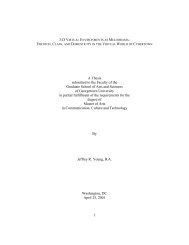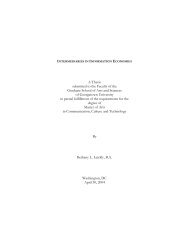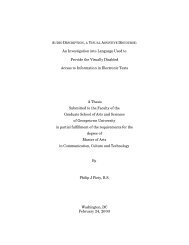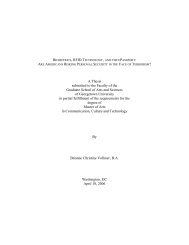A Comparative Case Study of Global Marketing and Ethnocentrism ...
A Comparative Case Study of Global Marketing and Ethnocentrism ...
A Comparative Case Study of Global Marketing and Ethnocentrism ...
You also want an ePaper? Increase the reach of your titles
YUMPU automatically turns print PDFs into web optimized ePapers that Google loves.
It is not surprising, they relate, that many people <strong>of</strong> the industrial cultures think that the<br />
developing cultures are inferior to them (1). This hidden assumption is embedded in<br />
countries like the U.S., Canada, UK, France, Germany Italy <strong>and</strong> Japan, which are rated<br />
higher than most in terms <strong>of</strong> science <strong>and</strong> technology achievement. Such an assumption<br />
prompts one to ask, why should industrial, scientific or technological achievements be<br />
accorded such a high value in rating a culture? How can one discount the moral,<br />
aesthetic, ecological <strong>and</strong> other aspects <strong>of</strong> a culture, which are <strong>of</strong>ten found to be<br />
neglected in the economically developed societies (Gupta <strong>and</strong> Chattopadhyaya 2)? In<br />
an anxious search for cultural universals, common structural features <strong>of</strong> all cultures,<br />
one tends to lose site <strong>of</strong> the distinct identity <strong>of</strong> each (Gupta <strong>and</strong> Chattopadhyaya 11).<br />
Kalyan Sen Gupta defines culture as a specific society with all <strong>of</strong> its tools,<br />
possessions <strong>and</strong> characteristic ways <strong>and</strong> conceptions <strong>of</strong> life (115). In this sense culture<br />
has a distinctive flavor <strong>of</strong> its own that is not shared by other cultures. <strong>Ethnocentrism</strong> is<br />
described here in terms <strong>of</strong> failing to appreciate the normative traits <strong>and</strong> excellence <strong>of</strong><br />
other cultures besides one’s own. The more one can leave behind the pejorative sense<br />
<strong>of</strong>ten attributed to such words as “savage” or “tribe”, the easier it becomes to<br />
underst<strong>and</strong> people who do not belong to one’s own culture (Gupta <strong>and</strong> Chattopadhyaya<br />
1).<br />
Richard Shusterman argues that underst<strong>and</strong>ing the other is a necessary means<br />
<strong>of</strong> underst<strong>and</strong>ing oneself <strong>and</strong> vice versa (107). He is saying that to be culturally aware<br />
is not only a good thing in terms <strong>of</strong> getting to appreciate another culture, but it is also<br />
9






